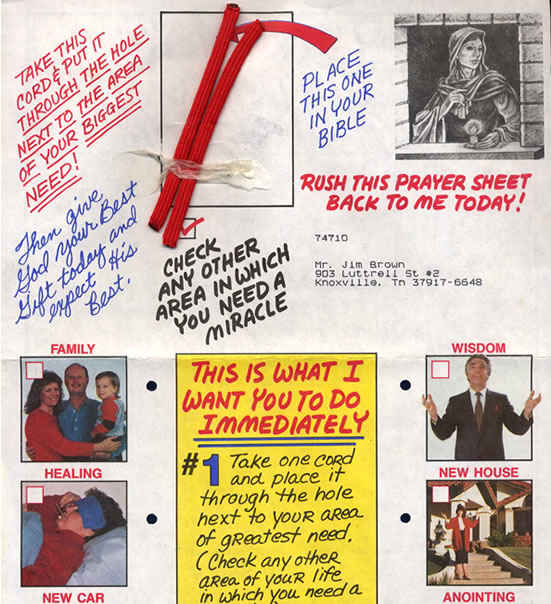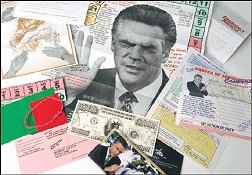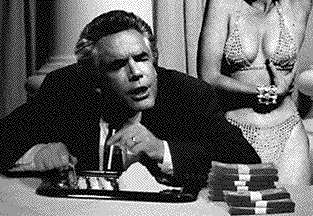rotten > Library > Biographies > Religion > Televangelists > Robert Tilton

Robert Tilton
"Take the enclosed poster of me and put it up on your refrigerator or mirror,
somewhere so you'll see it every day. Then for the next 21 days, lay your hand
on top of mine and agree with me that you deserve a miracle."
 In
the late eighties and early nineties, television pastor Robert Tilton
and his World Outreach Center Church perfected the half-hour religious infomercial.
His "Success-N-Life" advertisements, which never actually subscribed
to any specific faith, could be seen in all two hundred and fifty three U.S.
television markets. For a good long while he managed to avoid the same media
scrutiny responsible for bringing down Jim Bakker, Jimmy Swaggart and
numerous others. In
the late eighties and early nineties, television pastor Robert Tilton
and his World Outreach Center Church perfected the half-hour religious infomercial.
His "Success-N-Life" advertisements, which never actually subscribed
to any specific faith, could be seen in all two hundred and fifty three U.S.
television markets. For a good long while he managed to avoid the same media
scrutiny responsible for bringing down Jim Bakker, Jimmy Swaggart and
numerous others.
 Apart
from his frosted pompadour and Howdy-Doody dimples, what really set Mr. Tilton
apart from the rest were his insane facial contortions, pregnant pauses, indecipherable
babblings, and overarching hyperventilated enthusiasm for collecting money under
the auspices of serving the Lord. The only thing more insane than his coke-induced,
schizophrenic body language was his ridiculous collection of marketing materials,
many of which have secured their rightful place in history as perhaps the
most entertaining and curious novelties in the world of faith-based brand identity. Apart
from his frosted pompadour and Howdy-Doody dimples, what really set Mr. Tilton
apart from the rest were his insane facial contortions, pregnant pauses, indecipherable
babblings, and overarching hyperventilated enthusiasm for collecting money under
the auspices of serving the Lord. The only thing more insane than his coke-induced,
schizophrenic body language was his ridiculous collection of marketing materials,
many of which have secured their rightful place in history as perhaps the
most entertaining and curious novelties in the world of faith-based brand identity.
 These
trinkets were snatched up in the early 1990s by prank-calling teenagers or junk
mail enthusiasts who had never seen anything like what Tilton would send to
their house for free—gifts given ostensibly for the purposes of instilling
in the recipient an obligation to reciprocate financially. These
trinkets were snatched up in the early 1990s by prank-calling teenagers or junk
mail enthusiasts who had never seen anything like what Tilton would send to
their house for free—gifts given ostensibly for the purposes of instilling
in the recipient an obligation to reciprocate financially.  The
mailings were often accompanied by testimonials: letters from former sufferers
of peptic ulcers, layoffs, cigarette addiction, deadly spider bites, rebellious
children, infertility, insomnia, and AIDS. They describe (in impish, hand-lettered
fonts) how their lives were "turned around" after sending money to
Tilton. Inevitably, these people find the act of telling their stories so profoundly
moving that by the last paragraph, the caps lock has been fully deployed. The
mailings were often accompanied by testimonials: letters from former sufferers
of peptic ulcers, layoffs, cigarette addiction, deadly spider bites, rebellious
children, infertility, insomnia, and AIDS. They describe (in impish, hand-lettered
fonts) how their lives were "turned around" after sending money to
Tilton. Inevitably, these people find the act of telling their stories so profoundly
moving that by the last paragraph, the caps lock has been fully deployed.
 My
two best friends had just sued me. My landlord had served me with an eviction
notice. I was jobless and flat broke. I wouldn't answer the telephone because
I knew it would be a bill collector. I was cowering in a chair with all my curtains
closed. Heartbreaking love songs gushed from the stereo. I lit a joint. Robert
Tilton was praying on TV. I can't explain it, but I heard him say, 'You. Right
there. You're smoking a joint.' I dropped the joint and he said, 'You just dropped
it.' I started crying. I KNEW IT WAS GOD TALKING TO ME. My
two best friends had just sued me. My landlord had served me with an eviction
notice. I was jobless and flat broke. I wouldn't answer the telephone because
I knew it would be a bill collector. I was cowering in a chair with all my curtains
closed. Heartbreaking love songs gushed from the stereo. I lit a joint. Robert
Tilton was praying on TV. I can't explain it, but I heard him say, 'You. Right
there. You're smoking a joint.' I dropped the joint and he said, 'You just dropped
it.' I started crying. I KNEW IT WAS GOD TALKING TO ME.
 Envelopes
from Tilton were colorful inside and out, and plenty thick. They were described
as "redemption packets," containing nearly ten back-to-back pages
of typed and scribbled notations resembling the discarded napkin doodlings of
a mental patient. Sometimes they contained "magic" pennies, cheap
metal crosses on neck chains, rubber bands, complimentary stickers or vegetable
seeds, packets of salt, lengths of yarn, swatches of carpet samples, even brown
grass lawn clippings in plastic sandwich bags. Each was part and parcel of an
intimate religious ceremony the recipient could conduct in the privacy of his
or her own home. Envelopes
from Tilton were colorful inside and out, and plenty thick. They were described
as "redemption packets," containing nearly ten back-to-back pages
of typed and scribbled notations resembling the discarded napkin doodlings of
a mental patient. Sometimes they contained "magic" pennies, cheap
metal crosses on neck chains, rubber bands, complimentary stickers or vegetable
seeds, packets of salt, lengths of yarn, swatches of carpet samples, even brown
grass lawn clippings in plastic sandwich bags. Each was part and parcel of an
intimate religious ceremony the recipient could conduct in the privacy of his
or her own home.
"Right now this cloth is plain fabric," one fold-out poster reads.
A swiftly scribbled arrow sweeps down the page, pointing to a 2-inch square
of nylon-cotton blended silk, Scotch taped to a 3x5 index card. "But after
you send it back with a $1000 vow, it will be a Miracle Cloth saturated
with the presence of God.  Open
the enclosed package of special oil and anoint the point of your need. Let the
Holy Spirit lead you in applying this Miracle Anointing Oil and Miracle Cloth
in faith to pictures of your loved ones, to your billfold, to the doorposts
of your home, to your body. However he shows you, apply this Miracle Cloth and
Anointing Oil in faith for special miracles." Open
the enclosed package of special oil and anoint the point of your need. Let the
Holy Spirit lead you in applying this Miracle Anointing Oil and Miracle Cloth
in faith to pictures of your loved ones, to your billfold, to the doorposts
of your home, to your body. However he shows you, apply this Miracle Cloth and
Anointing Oil in faith for special miracles."
At his peak, Tilton was purchasing 5,000 hours of air time each month. His
mass-market ministry pulled in an estimated $80 million per year, and his church
drew as many as 5,000 worshippers to Sunday service. Tilton gleaned the donations
by pitching a narrow, well-oiled version of the Pentecostal prosperity gospel:
in exchange for a $1,000 vow, Tilton promised to lobby God for miraculous  improvements
to your health and finances. According to one survey, he spent 68 percent of
his air time asking for money."If Jesus Christ were alive today and walking
around, he wouldn't want his people driving Volkswagens and living in apartments,"
he was quoted as saying. improvements
to your health and finances. According to one survey, he spent 68 percent of
his air time asking for money."If Jesus Christ were alive today and walking
around, he wouldn't want his people driving Volkswagens and living in apartments,"
he was quoted as saying.
The Trinity Foundation, an aggressive televangelism watchdog group, took notice
of Tilton's antics. Armed with a team of private investigators, the Foundation
conducted trash sweeps of the dumpsters behind his ministry headquarters, and
turned over their findings to Diane Sawyer and ABC Television's PrimeTime
Live. ABC broadcast their report in November of 1991, including an interview
with a woman who spent two days opening mail for Tilton. She told reporters
that she and other workers were instructed to remove any cash, checks, or jewelry
from the returned mailers, and throw the prayer requests written to Tilton (caution:
spoilers) into the trash can.
  "You're
sat down in a cubicle and given a letter opener," she began. "You
have bundles and bundles of mail and a trash bin beside you. You slice open
the envelope, take the money out and throw the letter away in the bin. You cannot
help but read them. All these letters were like, 'Pray for me,' because they
were terminal or their son is terminal or there was no money for food. Desperate
situations. There would be like $17, and the letter would say, 'I realize I
have to give $2 more than I usually give'. You open enough envelopes to generate
$1,000 an hour. It was unbelievable, literally unbelievable." "You're
sat down in a cubicle and given a letter opener," she began. "You
have bundles and bundles of mail and a trash bin beside you. You slice open
the envelope, take the money out and throw the letter away in the bin. You cannot
help but read them. All these letters were like, 'Pray for me,' because they
were terminal or their son is terminal or there was no money for food. Desperate
situations. There would be like $17, and the letter would say, 'I realize I
have to give $2 more than I usually give'. You open enough envelopes to generate
$1,000 an hour. It was unbelievable, literally unbelievable."
 PrimeTime's
ratings, which had been low, improved following the Tilton broadcast. Tilton's
ministry suffered measurably from the fallout of videotaped evidence depicting
thousands of torn-up prayer requests in Hefty-brand garbage sacks slogged away
in the dumpsters. PrimeTime's
ratings, which had been low, improved following the Tilton broadcast. Tilton's
ministry suffered measurably from the fallout of videotaped evidence depicting
thousands of torn-up prayer requests in Hefty-brand garbage sacks slogged away
in the dumpsters.
In April of 1994, Tilton and his ministry were sued successfully for $1.5 million
by Vivian Elliott, a woman who suffered from depression relating to childhood
abuse. Vivian had attended a barbecue at her parents' house, after which she
went home and wrote a suicide note to her husband and children. She drove to
a wooded area and contemplated taking her own life, but while sitting in her
car, she heard God tell her to return home—which she did. The next morning,
Vivian saw Tilton's Success-N-Life commercial, during which Tilton announced
that he felt someone "depressed" was watching, and he instructed this
unidentified p erson
to call the Word of Faith prayer line immediately. erson
to call the Word of Faith prayer line immediately.
Mrs. Elliott felt as though Tilton was speaking directly to her, and that he
had been sent by God to reinforce her religious experience from the night before.
She called, and in addition to making a large monetary vow, Vivian was eventually
persuaded to make a video testimonial for use on Tilton's television program.
Although Tilton's representatives later denied any such representation, Mrs.
Elliott testified that she was told that any money generated by the use of her
testimonial would be used to set up a crisis center to help people who had suffered
the same kind of abuse she had.
When Vivian finally saw the edited testimonial, she became very upset. Dramatic
recreations meant to depict the type of abuse she suffered as a child had been
exaggerated to cartoonish, embarrassing levels—and despite her calls and
letters to Word of Faith asking that the testimonial not be shown, Mrs. Elliott
received no response.
 The
September 30, 1993 edition of the San Jose Mercury News reported that
Tilton was finally going off the air, blaming damage done to his ministry by
the information brought to light by PrimeTime Live. The
September 30, 1993 edition of the San Jose Mercury News reported that
Tilton was finally going off the air, blaming damage done to his ministry by
the information brought to light by PrimeTime Live.  According
to the article, "the ABC report alleged that Tilton never prayed personally
over each letter as promised, and that a processing company in Tulsa threw out
prayer requests after contributions were deposited in the bank." Tilton's
lawyer insisted those allegations were incorrect. According
to the article, "the ABC report alleged that Tilton never prayed personally
over each letter as promised, and that a processing company in Tulsa threw out
prayer requests after contributions were deposited in the bank." Tilton's
lawyer insisted those allegations were incorrect.
Tilton's Word of Faith church was sold to the city of Farmers Branch, Texas,
for $6.1 million in 1999. The Branch made plans to convert the 13-acre property
into a convention center. Tilton used a portion of the money to settle a million-dollar
fraud lawsuit filed by his first wife, Marte, in 1996.
After he and Marte divorced in 1993, Tilton married evangelist and former beauty
queen Leigh Valentine. Valentine then turned around and divorced him two years
later, citing constant abuse. He would throw her down stairs, slam her against
walls, hurl  cordless
telephones at her head, drink himself into blind rages (often declaring he was
the Pope) and wake up in the night screaming that rats were eating his brain.
During divorce proceedings, she cited his constant paranoia and "disguise
kits" (fake moustaches, $1200 custom-made wigs) which he'd wear frequently
during their first year of marriage. cordless
telephones at her head, drink himself into blind rages (often declaring he was
the Pope) and wake up in the night screaming that rats were eating his brain.
During divorce proceedings, she cited his constant paranoia and "disguise
kits" (fake moustaches, $1200 custom-made wigs) which he'd wear frequently
during their first year of marriage.
Tilton has since married a Florida woman, Maria Rodriguez. More than ten years
after the collapse of his ministry, he's still reaching millions of television
viewers from his mailing list—and several years ago his televised informercials
were picked up by Black Entertainment Television.
Since then, he's formed two companies, bought a 50-foot yacht, and nabbed a
piece of oceanfront property in Miami Beach valued at $1.3 million. To this
day, Tilton is universally recognized as the unwitting star of the "Pastor
Gas" or "Farting Preacher" series of underground videotapes—
a montage of scenes from his insane television broadcasts, with funny fart noises
layered into the soundtrack and synchronized with his constipated facial expressions.
Pornopolis |
Rotten |
Faces of Death |
Famous Nudes
|

 In
the late eighties and early nineties, television pastor Robert Tilton
and his World Outreach Center Church perfected the half-hour religious infomercial.
His "Success-N-Life" advertisements, which never actually subscribed
to any specific faith, could be seen in all two hundred and fifty three U.S.
television markets. For a good long while he managed to avoid the same media
scrutiny responsible for bringing down
In
the late eighties and early nineties, television pastor Robert Tilton
and his World Outreach Center Church perfected the half-hour religious infomercial.
His "Success-N-Life" advertisements, which never actually subscribed
to any specific faith, could be seen in all two hundred and fifty three U.S.
television markets. For a good long while he managed to avoid the same media
scrutiny responsible for bringing down  Apart
from his frosted pompadour and Howdy-Doody dimples, what really set Mr. Tilton
apart from the rest were his insane facial contortions, pregnant pauses, indecipherable
babblings, and overarching hyperventilated enthusiasm for collecting money under
the auspices of serving the Lord. The only thing more insane than his coke-induced,
schizophrenic body language was his ridiculous collection of marketing materials,
many of which have secured their rightful place in history as perhaps the
most entertaining and curious novelties in the world of faith-based brand identity.
Apart
from his frosted pompadour and Howdy-Doody dimples, what really set Mr. Tilton
apart from the rest were his insane facial contortions, pregnant pauses, indecipherable
babblings, and overarching hyperventilated enthusiasm for collecting money under
the auspices of serving the Lord. The only thing more insane than his coke-induced,
schizophrenic body language was his ridiculous collection of marketing materials,
many of which have secured their rightful place in history as perhaps the
most entertaining and curious novelties in the world of faith-based brand identity.
 These
trinkets were snatched up in the early 1990s by prank-calling teenagers or junk
mail enthusiasts who had never seen anything like what Tilton would send to
their house for free—gifts given ostensibly for the purposes of instilling
in the recipient an obligation to reciprocate financially.
These
trinkets were snatched up in the early 1990s by prank-calling teenagers or junk
mail enthusiasts who had never seen anything like what Tilton would send to
their house for free—gifts given ostensibly for the purposes of instilling
in the recipient an obligation to reciprocate financially.  The
mailings were often accompanied by testimonials: letters from former sufferers
of peptic ulcers, layoffs, cigarette addiction, deadly spider bites, rebellious
children, infertility, insomnia, and AIDS. They describe (in impish, hand-lettered
fonts) how their lives were "turned around" after sending money to
Tilton. Inevitably, these people find the act of telling their stories so profoundly
moving that by the last paragraph, the caps lock has been fully deployed.
The
mailings were often accompanied by testimonials: letters from former sufferers
of peptic ulcers, layoffs, cigarette addiction, deadly spider bites, rebellious
children, infertility, insomnia, and AIDS. They describe (in impish, hand-lettered
fonts) how their lives were "turned around" after sending money to
Tilton. Inevitably, these people find the act of telling their stories so profoundly
moving that by the last paragraph, the caps lock has been fully deployed. My
two best friends had just sued me. My landlord had served me with an eviction
notice. I was jobless and flat broke. I wouldn't answer the telephone because
I knew it would be a bill collector. I was cowering in a chair with all my curtains
closed. Heartbreaking love songs gushed from the stereo. I lit a joint. Robert
Tilton was praying on TV. I can't explain it, but I heard him say, 'You. Right
there. You're smoking a joint.' I dropped the joint and he said, 'You just dropped
it.' I started crying. I KNEW IT WAS GOD TALKING TO ME.
My
two best friends had just sued me. My landlord had served me with an eviction
notice. I was jobless and flat broke. I wouldn't answer the telephone because
I knew it would be a bill collector. I was cowering in a chair with all my curtains
closed. Heartbreaking love songs gushed from the stereo. I lit a joint. Robert
Tilton was praying on TV. I can't explain it, but I heard him say, 'You. Right
there. You're smoking a joint.' I dropped the joint and he said, 'You just dropped
it.' I started crying. I KNEW IT WAS GOD TALKING TO ME.  Envelopes
from Tilton were colorful inside and out, and plenty thick. They were described
as "redemption packets," containing nearly ten back-to-back pages
of typed and scribbled notations resembling the discarded napkin doodlings of
a mental patient. Sometimes they contained "magic" pennies, cheap
metal crosses on neck chains, rubber bands, complimentary stickers or vegetable
seeds, packets of salt, lengths of yarn, swatches of carpet samples, even brown
grass lawn clippings in plastic sandwich bags. Each was part and parcel of an
intimate religious ceremony the recipient could conduct in the privacy of his
or her own home.
Envelopes
from Tilton were colorful inside and out, and plenty thick. They were described
as "redemption packets," containing nearly ten back-to-back pages
of typed and scribbled notations resembling the discarded napkin doodlings of
a mental patient. Sometimes they contained "magic" pennies, cheap
metal crosses on neck chains, rubber bands, complimentary stickers or vegetable
seeds, packets of salt, lengths of yarn, swatches of carpet samples, even brown
grass lawn clippings in plastic sandwich bags. Each was part and parcel of an
intimate religious ceremony the recipient could conduct in the privacy of his
or her own home.
 Open
the enclosed package of special oil and anoint the point of your need. Let the
Holy Spirit lead you in applying this Miracle Anointing Oil and Miracle Cloth
in faith to pictures of your loved ones, to your billfold, to the doorposts
of your home, to your body. However he shows you, apply this Miracle Cloth and
Anointing Oil in faith for special miracles."
Open
the enclosed package of special oil and anoint the point of your need. Let the
Holy Spirit lead you in applying this Miracle Anointing Oil and Miracle Cloth
in faith to pictures of your loved ones, to your billfold, to the doorposts
of your home, to your body. However he shows you, apply this Miracle Cloth and
Anointing Oil in faith for special miracles." improvements
to your health and finances. According to one survey, he spent 68 percent of
his air time asking for money."If Jesus Christ were alive today and walking
around, he wouldn't want his people driving Volkswagens and living in apartments,"
he was quoted as saying.
improvements
to your health and finances. According to one survey, he spent 68 percent of
his air time asking for money."If Jesus Christ were alive today and walking
around, he wouldn't want his people driving Volkswagens and living in apartments,"
he was quoted as saying.
 "You're
sat down in a cubicle and given a letter opener," she began. "You
have bundles and bundles of mail and a trash bin beside you. You slice open
the envelope, take the money out and throw the letter away in the bin. You cannot
help but read them. All these letters were like, 'Pray for me,' because they
were terminal or their son is terminal or there was no money for food. Desperate
situations. There would be like $17, and the letter would say, 'I realize I
have to give $2 more than I usually give'. You open enough envelopes to generate
$1,000 an hour. It was unbelievable, literally unbelievable."
"You're
sat down in a cubicle and given a letter opener," she began. "You
have bundles and bundles of mail and a trash bin beside you. You slice open
the envelope, take the money out and throw the letter away in the bin. You cannot
help but read them. All these letters were like, 'Pray for me,' because they
were terminal or their son is terminal or there was no money for food. Desperate
situations. There would be like $17, and the letter would say, 'I realize I
have to give $2 more than I usually give'. You open enough envelopes to generate
$1,000 an hour. It was unbelievable, literally unbelievable." PrimeTime's
ratings, which had been low, improved following the Tilton broadcast. Tilton's
ministry suffered measurably from the fallout of videotaped evidence depicting
thousands of torn-up prayer requests in Hefty-brand garbage sacks slogged away
in the dumpsters.
PrimeTime's
ratings, which had been low, improved following the Tilton broadcast. Tilton's
ministry suffered measurably from the fallout of videotaped evidence depicting
thousands of torn-up prayer requests in Hefty-brand garbage sacks slogged away
in the dumpsters. erson
to call the Word of Faith prayer line immediately.
erson
to call the Word of Faith prayer line immediately. The
September 30, 1993 edition of the San Jose Mercury News reported that
Tilton was finally going off the air, blaming damage done to his ministry by
the information brought to light by PrimeTime Live.
The
September 30, 1993 edition of the San Jose Mercury News reported that
Tilton was finally going off the air, blaming damage done to his ministry by
the information brought to light by PrimeTime Live.  According
to the article, "the ABC report alleged that Tilton never prayed personally
over each letter as promised, and that a processing company in Tulsa threw out
prayer requests after contributions were deposited in the bank." Tilton's
lawyer insisted those allegations were incorrect.
According
to the article, "the ABC report alleged that Tilton never prayed personally
over each letter as promised, and that a processing company in Tulsa threw out
prayer requests after contributions were deposited in the bank." Tilton's
lawyer insisted those allegations were incorrect. cordless
telephones at her head, drink himself into blind rages (often declaring he was
the Pope) and wake up in the night screaming that rats were eating his brain.
During divorce proceedings, she cited his constant paranoia and "disguise
kits" (fake moustaches, $1200 custom-made wigs) which he'd wear frequently
during their first year of marriage.
cordless
telephones at her head, drink himself into blind rages (often declaring he was
the Pope) and wake up in the night screaming that rats were eating his brain.
During divorce proceedings, she cited his constant paranoia and "disguise
kits" (fake moustaches, $1200 custom-made wigs) which he'd wear frequently
during their first year of marriage.